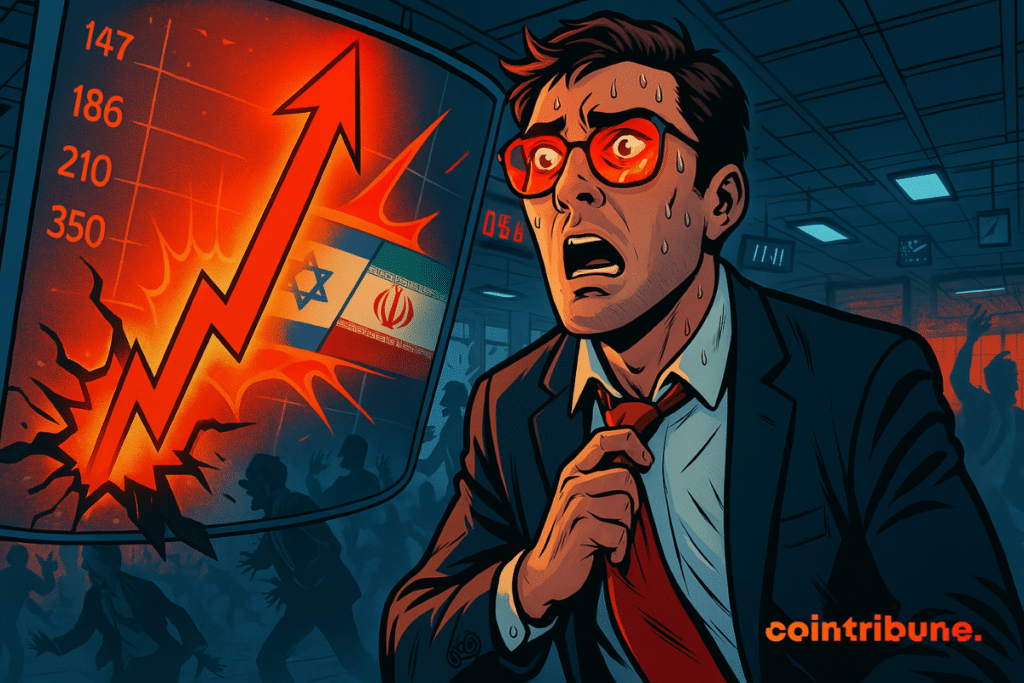Oil Prices Soar After Israeli Strikes on Iran
Is Israel feeling emboldened? After Gaza, after Lebanon, here is Iran. As the missiles take off, certainties collapse. Benjamin Netanyahu orchestrates a high-intensity technological war. But the strikes do not only hit Iranian silos. The stock market stumbles, the global economy wavers, and geopolitics becomes unstable. A simple military operation? No. A global earthquake. The markets have caught the message: the war, this time, is real.

In Brief
- Iran vs Israel: Brent climbs more than 7%, triggering a wave of panic in the markets.
- Asian and European stock markets fall, while gold reaches its highest levels.
- The Strait of Hormuz becomes a strategic hot spot for global oil supply.
- Trump threatens Tehran, Putin condemns the escalation, each playing their part against the backdrop of oil.
Oil on fire, stock markets on their knees: markets in the storm
Israeli strikes on Iran caused a bitcoin drop to $103,000, but that’s not all. Oil is rising as if trying to flee the war. Brent jumped by more than 7%, reaching $74.40 per barrel. The WTI, its American cousin, followed with +7.72%, at $73.29. You have to go back to 2022 to find such a surge. The symbol is strong: oil markets are taking the shock seriously.
At the same time, the stock market wobbles. In London, the FTSE 100 opened down 0.6%. In Asia, the drop was steep. In Moscow however, indices rise. Russian energy stocks are rubbing their hands. Some see it as a geopolitical revenge. “Safe haven” assets are also gaining ground: gold climbs to $3,423.30 an ounce, its highest in two months.
The atmosphere is electric. “It is an explosive situation, even if it can defuse quickly“, analyzes Vandana Hari in the pages of the BBC. But no one is betting on calm. Tension is high. Even bitcoin shivers. It has climbed back to $105,300, but remains below its record. And traders know one thing: war spares no exchange.
Hormuz, vital crossroads: the global economy in the sights
The Strait of Hormuz (or Ormuz) is not just a maritime corridor. It is the heart artery of the global energy economy. Each day, nearly 20% of the world’s oil passes through it. Bordered to the north by Iran and to the south by Oman and the United Arab Emirates, it is a critical point. Iran could target it in retaliation. If that happened, the oil market would be paralyzed.
The global economy does not need this. It is barely out of an inflationary cycle. And now energy prices are rising again. The term “stagflation shock” is being used. Slowed growth + reignited inflation = toxic cocktail. Analysts are already revising their forecasts.
Memories resurface: in 1979, a similar crisis caused oil prices to explode. In 2022, the war in Ukraine set a more recent precedent. The European economy had wavered. Today, the signals line up: soaring commodities, cautious central banks, global uncertainty.
Markets know the Strait of Hormuz is not a detail. It is strategic. And any threat to its stability is a threat to the global economy. Investors watch every tanker like a tension point. War is no longer only fought with bombs. It is also won with barrels.
Trump, Putin and others: when geopolitics weigh on the economy
While missiles fall, the great powers adjust. Donald Trump spoke out:
Iran must make a deal, before there is nothing left.
But this diplomatic attempt feels like a slap. Iran has just retaliated. 100 drones sent towards Israel. Negotiation? Not really.
And Vladimir Putin? Russia condemns the Israeli attack. It speaks of “unacceptable escalation“. And in the press, some have called him the “great beneficiary of the conflict“. Why? Because rising oil prices benefit him. Moscow sells its crude at higher prices. And every barrel exported is an economic victory.
China remains silent but vigilant. Europe, meanwhile, is divided. Some call for calm, others strengthen their support for Israel. The global economy has become a diplomatic balancing act. And every misstep has direct consequences on the stock market.
Key figures to remember:
- +7.27% increase in Brent, strongest movement since 2022;
- 20% of global oil passes through the Strait of Hormuz;
- $3,423.30: gold price, two-month high;
- One hundred Iranian drones sent against Israel after the strikes;
- -1.2% to -1.5% for US futures contracts post-attack.
The crypto market is not spared. History reminds us: in April 2024, bitcoin had fallen below $60,000 after an escalation between Israel and Iran. Today, while targeting $110,000, its run was abruptly halted. The queen of cryptos still trembles when war rages in the Middle East.
Maximize your Cointribune experience with our "Read to Earn" program! For every article you read, earn points and access exclusive rewards. Sign up now and start earning benefits.
La révolution blockchain et crypto est en marche ! Et le jour où les impacts se feront ressentir sur l’économie la plus vulnérable de ce Monde, contre toute espérance, je dirai que j’y étais pour quelque chose
The views, thoughts, and opinions expressed in this article belong solely to the author, and should not be taken as investment advice. Do your own research before taking any investment decisions.